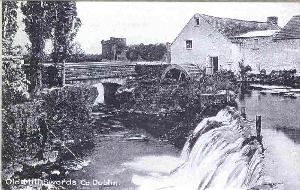|
|
A History Of Swords Dublin-The West Side Swords - The West Side, A Social History And The Old Mill
Continuing on the left, from Connor's Lane, Connors were dealers in coal, milk and farm produce, had some land, and let
cars for hire, and had an: adjoining house as a registered lodging house, 3d. a night for bed and the use of fire for cooking
meals, which the lodger supplied. Next, Larry McKenna, the local barber, a great story teller, ghost stories, fairy lore,
etc., which entertained the customers during the haircut or shave, while the wife smoked her clay pipe beside the 'ire. The
barber's fees sometimes were not enough to keep Larry and the wife in drinks, etc., so he had a mysterious small tin trunk
which he carried off out the country and he peddled odds and ends -laces, studs, pins, etc., etc., to swell his income.
Next door was Kellys, whose father was a merchant sailor who came home at intervals from long voyages. He had a nice
family of girls, teachers and nurses, and his widow opened a shop on the opposite side of the street when he died. Hoiards
were in this house after Kellys. Next house, before 190.), was occupied by a family, NcEvoys, who were nail makers.
They had a forge behind the house, and made cut nails for boarding floors and other heavy carpentry work. The nails were
made by hand from long strips of metal. When machine made nails were introduced this business ceased. The old nailer and his
three sons did a good trade at this business in his hay day. This house was later occupied by one Policeman after another.
Next house, Bolgers, tailor. A dignified old man who always wore a tall hat, and black frock coat.
A good respectable tradesman who lived with his maiden sister, R.osie, 0ar own house, Colemans, came next. There was
an archway through the front of the house with closed gates. There was a grocery shop in front. Two parlours and kitchen and
five bedrooms upstairs. A big yard and a long garden beyond the walled-in yard stretching down to the Ward river. From here
there was a nice view with poplar trees, a mill race and weir. The old water mill worked up to recent years. A distant view
showed a range of verdant hills from Tara, Co. Meath, to the sea at Skerries,
Next door below our house was Glasgow's pub. John Glasgow's was the only pub in Swords at one time, which sold Guinness
stout and porter, as all the other pubs were controlled by smaller Dublin Breweries like the Phoenix, Pbuntjoy, and D'Arcy's
Breweries. Next to Glasgow's pub was Earley's Lane - a narrow lane with a rectangular turn leading to two farmyards, i.e.
a small farmer, Peter Earley and a big farmer, Peter Earley of Earley's Hotel. The small farmer w:as nick-named Wretch Earley.
He had a very restive old black mare, and when shouting at his steed, he used to shout "Stop you wretch" or "Go on you wretch",
and the nick-name passed from the horse to the man,
When the threshing mill came with steam engine and mill wagon, -it was an hour of excitement to navigate the bend in
Earley Lane, and the team of 20 or 30 threshing workmen would help to push and steer the two cumbersome vehicles around the
narrow crooked bend, and old Glasgow, the publican, would be out watching that the engine didn't colide with his gable end
wall. There were hay barns and back yards in the Wretch Earley's farm buildings, where we had many happy childhood days, and
he would get us to help with the hay and the corn, and gave us rides to his fields in the big cart in return.
The big Earleys were more exclusive and as a great treat we would steal in to see the threshing, and catch .mice in the
corn ricks as they were being thrown down to the mill. Peter Earley's house was on the other corner of the lane and his wife
Hag sold milk to local customers. Next to Peter Earley (small farmer) was Paddy Coleman, tailor. Earley's Hotel came next.
It was more a pub than a hotel but an odd traveller stayed there.
Peter Earley had a large family, five daughters and five sons. His sons all became banisters or solicitors, except one
kept on the farm. They had a beautiful compact farm on the Malahide Road, but it passed out of the family in later years.
The Post Office came next - Matthew Keane, Postmaster, ex. sergeant, R.I.C. Before Keanes came there, there was a Mrs. Maguire,
and the Post Office was at the end of the town.
Below the Post Office was Mrs. Savage, dealer, sweet shop, car hirer and general vendor. One son drove the mail car; another drove a long car to carry passengers to Malahide Railway Station. Her daughter, Ellen, kept the sweet shop. They are still in business, carried on by the third generation. The next house was Phillips, a Protestant family, gentleman farmer and drapery shop. Next was a big grocery shop, once managed by Williams of Dublin, but owned by Lwsons, the racehorse trainer of Cloghran, and later sold to McGowan, their Manager. This brings us to the turn to the Pound and the Green. |
||||||
|
|

